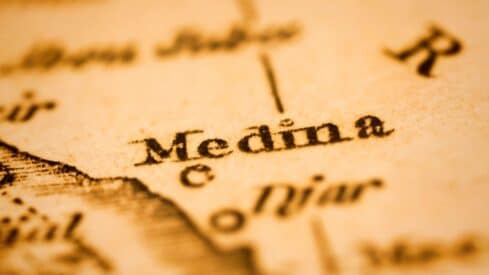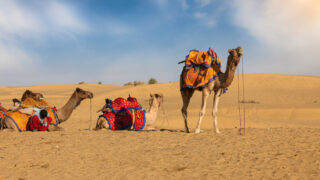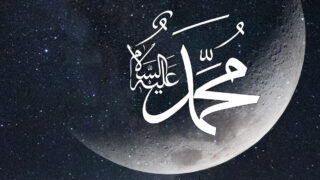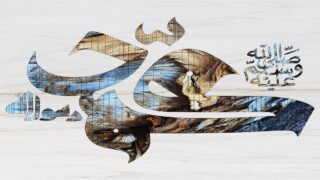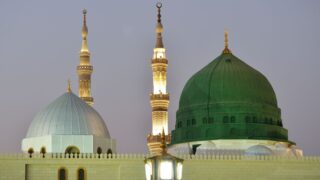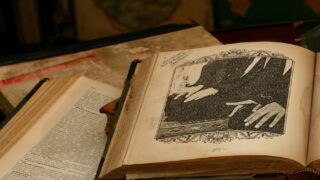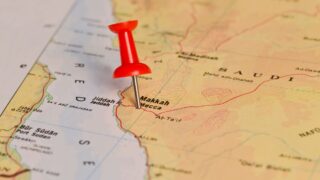Part of the reports that was narrated in describing the Messenger of God:
Description of Ummu Ma’bad
The mother of Ma`bad Al-Khuza`iyya said in describing the Messenger of God, may God bless him and grant him peace, to her husband, when he passed by her tent while migrating: a man with obvious beauty and cleanliness, a glowing countenance, and a good appearance/disposition, with no bulging stomach disgracing him, or a small head disparaging him, he is overtly handsome and wholly beautiful, his eyes are wide and very white and black with long eyelashes whose voice is devoid Of hoarseness, his neck is long with full beard. the white part of his eyes is extremely white, while the black part is extremely black, as if his eyelids have kohl naturally. His eyebrows arch longitudinally and thinly (as if they) meet; his hair is extremely black, who is stately when silent and gorgeous when speaking; who is the most beautiful and striking man from far and the best and most beautiful from close; whose speech is sweet, clear, and decisive, neither vaguely short, nor boringly and pointlessly long; whose words flow forth like a perfect string of pearls: of medium height that neither elicits contempt to even him for shortness, nor aversion to him for excessive tallness: who is a branch between two branches he is the most radiant of the three and the most well-respected; whose companions surround him: when he speaks they listen attentively to his speech, and when he commands they vie with each Other to fulfil his commands. He is well served and attended, who is neither a scowler nor a prattler.
Description of Ali bin Abi Talib
‘Ali bin Abi Talib: said: while describing the Prophet (may the blessings and peace of Allah be upon him) he would say: ‘He was not extremely tall (Mummaghit), nor was he extremely short (Mutaraddid), and he was of medium height in relation to the people. The wave of his hair was not completely curly (Qatat), nor straight, but it was in between. He did not have a large head, nor a small head (Mukaltham), his face was round and a blended-white color (Mushrab), his eyes were dark black (Ad’aj), his eye-lashes were long (Ahdab). He was big-boned and broad shouldered (Al-Katad), his body hair was well-placed, and he had a Masrubah, his hands and feet were thick (Shathn). When he walked he walked briskly (Taqalla’), he leaned forward as if he was walking on a decline (Sabab). And if he turned his head, his body turned as well, between his two shoulders was the seal of Prophethood, and he was the seal of the Prophets. He was the most generous of people [in hand, and the most big-hearted of them] in breast. He was the most truthful of people in speech, the softest of them in nature, and the most noble of them in his relations (‘Ishrah). Whoever saw him for the first time (Badihah) would fear him, and whoever got to know him, loved him. The one who tried to describe him would have to say: ‘I have not seen before him or after him anyone who resembles him. May the blessings and peace of Allah be upon him.
Description of Hind bin Abi Hala
Allah’s Messenger (Allah bless him and give him peace) was constantly sympathetic with sorrows, persistent in thought, having no repose, prolonged in silence. He would not speak unnecessarily. He would introduce and conclude his speech with: ‘Bismillahi ta’ala [In the Name of Allah, Exalted is He]!’ He would speak using simple words bearing many profound meanings [bi-jawami’i ’l-kalim]. His speech was concise, neither excessive nor abridged. It was neither uncouth nor contemptible. He would extol a blessing, however small, and he would not find fault with any aspect of it. He neither condemned nor praised those who enjoyed food and drink, and he would not be angered by this world. If the truth were overstepped, he would be so furious that he could do nothing but right the wrong. He would not be angry for his own sake or come to his own defence. When he beckoned, he beckoned with the whole of the palm of his hand, and when he was astonished, he turned it over, and when he spoke, he gestured with his hands, and placed his right palm over the base of his left thumb. When he was angry, he turned away and averted his face, and when he was happy, he lowered his gaze. Most of his laughter was in the form of a smile that revealed teeth as white as hailstones’.”
He would not speak on what does not concern him. He assembles his companions not separate them, He honors the honored person of all people, and makes him the leader, he warns the people, and beware of them without turning away from any of them.
He inspects his companions – and asks people about their wellbeing, he improves the good and confirms it, and faults the ugly and disapproves it, he was moderate in his matters, not different, he does not neglect for fear that they may overlook or bore, to each case he has solution, he does not fall short of the truth, and does not go beyond it to others that have been colored by them, The best of them to him is the most general in advice, and the greatest of them to him is the best of them in comfort and support.
He would not sit or stand except on a remembrance of Allah, and he does not distinguish a place for himself if, he sits where the council ends, and orders that, and gives all those who sit by him what he is entitled to so that he thinks no is more honored than him, he endures whoever sat by him for a need and perseveres until he would be the one to departed from him, and he did not return whoever asked him a need except with it or with soft words, and the people have expanded his simplicity and character until he became their father, and they became equal to him in right but surpass one another with him in piety, his meeting characterized by manner, modesty, patience and honesty, in which voices do not raise, and sacredness is not violated in it, they sympathize with piety, revere the old, and show mercy to the young, provide for the one who is in need, and comfort the stranger.
He was in perpetual bouyance, easy in character, soft sided, neither rhetoric, nor coarse, nor clamor, nor obscene, nor reproach, nor flatter, neglecting what he does not desire but not despise it. He has left himself from three: hypocrisy, proliferation, and what does not concern him, and forsake People from three: does not offend anyone, not dishonor him, and he does not search into his fault, and he does not speak except in what he hopes for his reward. When he speaks, his listeners knock their heads, as if bird is on their heads, and when he is silent, they speak. they not quarrel to talk to him, They listen to whoever speaks among them until he is finishes. They dialogue on the talk of the first speaker, he laughs at what they laugh at, and he admires what they admire, he is patient with the stranger on misconduct, and he says: assist anyone in needif you see the one who is in need, and he does not seek praise except from an equivalent
Description of Amr ibn al-Aas
On the authority of Ibn Shumaasa Al-Mahari, he said: we attended Amr Ibn Al-Aas and he mentioned to us a long hadith where he mentioned that: “no one was more beloved to me than the messenger of Allah (may the blessings and peace of Allah be upon him) and no one was more superior to me than him, so bright was his splendor that I could not gather enough courage to look at his face for any length of time. If I were asked to describe his feature, I would not be able to do so because I have never caught a full glimpse of his face.. ”
And may God bless the best of people, our master, our beloved and our role model, Muhammad and his family and companions, and grant them peace.


